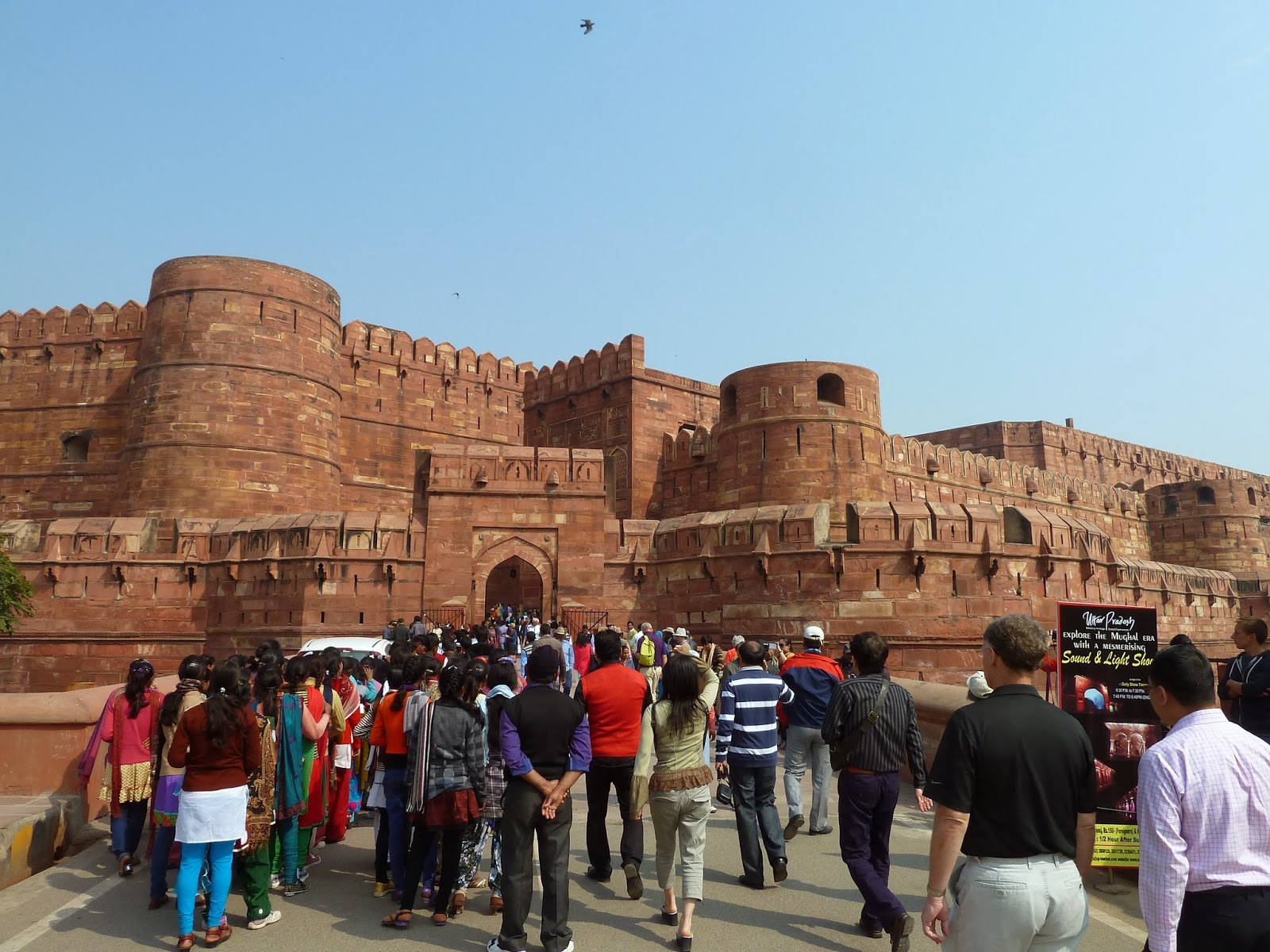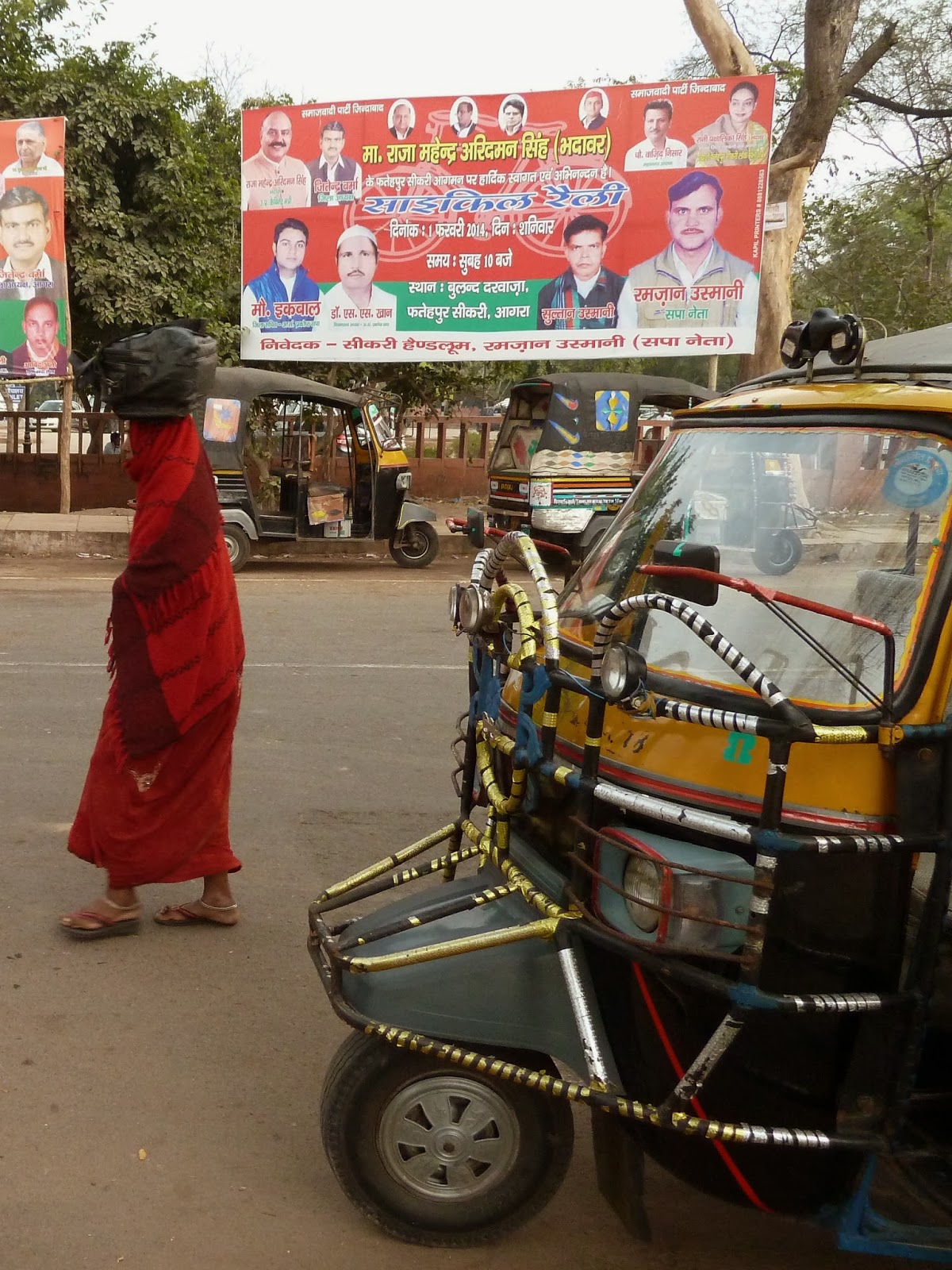Our hotel in Agra was quite nice considering the rest of the area, and I felt a tinge of guilt associated with the comfort we enjoyed. However, when I turned on the bath water and had to let it run for 10-minutes before it turned from a dark brown to a pale yellow color, I was reminded why we didn't even rinse our toothbrushes with anything but bottled water with sealed caps!
Arising early on Thursday, February 13, Jack, Manesh, Bob and I set out to tour the Taj Mahal. We drove into a nearby parking lot and selected a unique form of transportation to take us to the entrance gate. I was strongly advised to keep my head down, do not make eye-contact with anyone, and never reply to the hawkers which lined the street. It was a slow but fun mode of travel to the gate of the Taj, where the black inlaid marble calligraphy framing the gate welcomed us with the words, "O Soul, thou art at rest. Return to the Lord at peace with Him, and He at peace with you." The 22 small white domes placed above the gate represent each year it took to construct this masterpiece.
I don't think words can adequately describe how stunningly beautiful and elegant this wonder of the world really is! Inlaid in the marble are beautiful flower mosaics made up of thousands of precious stones which are carved and shaped perfectly into masterpieces of design. Some of the design work on the building resembles fine Persian rugs, and other shapes mimic earrings and other jewelry. To either side of the Taj Mahal were built two mirror image smaller red sandstone buildings which replicate the main mausoleum. These are believed to be for two of the Emperor's other wives. We were not allowed to photograph inside the building where a mock replica of the tombs of Shah Jahan and his beloved wife, Mumtaz are displayed. Their bodies lay encased below the main floor in caskets ornately decorated with gold and precious and semi-precious stones.
Agra became the Mughal's second capital city of India in 1558, and the red sandstone Agra Fort was rebuilt upon ruins of a fort constructed in the 1100's. This walled imperial city was the home of the Emperor Akbar, the grandfather of Shah Jahan. Jahan became emperor in 1627 and much of what remains of the fort are the works of his hand. He preferred buildings made of white marble inlaid with gold or semi-precious gems (which have all since been plundered and seized). The Emperor Jahan was said to have gone insane in the final years of his life and his son imprisoned him within the fort with a view to his beloved Taj Mahal, until his death.
Following our visits to the Taj Mahal and Agra Fort, we hailed an "auto" and our tour guide took us to several businesses showcasing the works of fine artisans in the area, including those who carry on the traditional stone inlay work that continues to be used to maintain and repair the Taj Mahal. I wish I could have had some time to shop for treasures on my own, because there are some very beautiful crafts and clothing to be found throughout India.



Within this imperial complex is the mausoleum containing the tomb of Salim Chishti, a Sufi (Islam) Saint, who predicted the birth of Akbar's son following many years of failure to produce an heir to his kingdom. We all had to cover our heads before entering the building.
Within Fatehpur Sikri is a huge mosque which is for available as a place of worship for men only. The last photo here is of the main gate leaving the city. Notice all the beehives hanging from the ceiling!
We were able to see much more of this complex than was open to the public at Agra Fort. As I viewed the magnificent structures detailed with intricate carvings and colorful paints, and imagined these beautiful edifices in their original state - adorned with precious stones and jewels - it is easy to see why the citizens of India take such great pride in their country. And yet my heart goes out to the humble and poor who live within the shadows of such opulence and pride. We were literally surrounded and followed around by children and men desperately trying to sale their trinkets to us. It was very wearing on us and difficult to deal with.
Leaving the fort we crammed into another little "auto" which took us back to our car. It was an excruciatingly long and bumpy six hour drive back to Dehli that night, as our lost driver plowed through fields and tiny country roads in search of the city. With very full bladders and growling empty stomachs, we finally arrived at our hotel. Like never before, I was grateful for the comforts of life we have grown accustomed to, but fail to adequately appreciate - thank you, India!








































































































